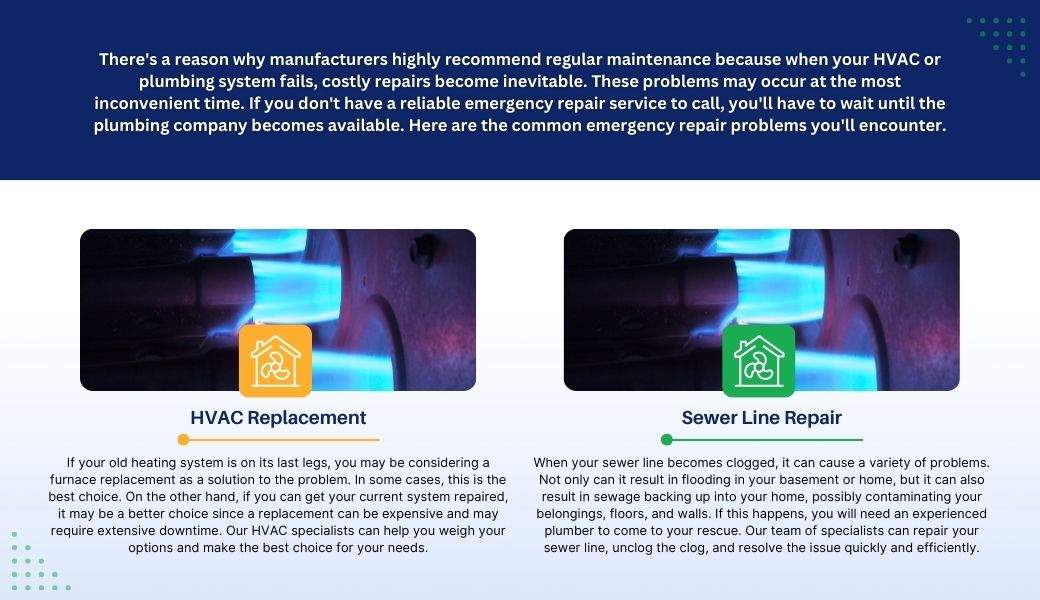Emergency Services
Call to Find Your Nearest Pro!
Have an Emergency? 1-800 Plumber +Air is Here to Help
Whenever you need us, we are here for you! What are the different problems that can happen that you may not know constitutes an emergency?
![]()
Emergency Plumbing
![]()
Emergency Cooling
![]()
Emergency Heating
![]()
Emergency Drain Cleaning
![]()
Emergency Commercial Plumbing
What to Do When a Plumbing or HVAC Emergency Comes Up?
We are available 24 hours a day, 7 days a week. We are a team of licensed, insured technicians. No matter the time of the day, you can rest assured that if you call us in the middle of the night, a trustworthy plumber or HVAC technician will be at your door. We care about our customers, and we know that emergency plumbing, heating, and cooling issues can be very stressful. That’s why we don’t want to add to their stress, so we don’t charge more; we charge by the job and not by the time.
1-800-Plumber +Air is here for you, our name is our number. Give us a call today, or Contact Us here.
Start Your Service Request
We know your time is valuable. Select the day and time that you would prefer and we will contact you ASAP, and work with your schedule for a hassle free experience.
When Should You Call for Emergency Repair Services?
Water Leaks
Water leaks are one of the most common sources of repair emergencies. From a dripping faucet to a busted pipe, water leaks can happen at any time and at any place in your home. If not detected and repaired quickly, water leaks can lead to major structural damage and the costly repair of other appliances. Our emergency plumbers can fix your leak quickly and prevent further damage to your home and plumbing systems.
Calling an emergency plumbing service to deal with problems like water leaks is necessary to prevent further damage. Leaks that are not properly addressed can lead to worsening the damage. A professional plumber has the tools and experience to identify the source of leaks.
LEARN MOREFrozen Pipes
The freezing weather can affect your piping system and over time, it will cause pipes to burst or crack. If frozen pipes are not caught early, they can cause flooding or leaks. Pipes will burst when it begins to unfreeze and the water runs again. If your pipes burst, you need to turn off your electric and water supply at the mains. While frozen pipes may not necessarily crack, they still need to thaw out to reduce the likelihood of burst pipes.
LEARN MOREBlocked Toilets
It's happened to all of us: the middle of the night, the toilet is blocked and we have no idea what to do. Blocked toilets are one of the most common plumbing emergencies, and they can be incredibly frustrating. The best thing to do is call a plumber.1-800-Plumber +Air of Pearland offers 24-hour emergency plumbing services to help you with any plumbing problem, including blocked toilets.
LEARN MOREGas Leak
One of the most dangerous things your heating system can experience is a gas leak. When this happens, you need to call a professional as quickly as possible. Gas leaks cause unhealthy levels of carbon monoxide and can be dangerous if not addressed quickly. In addition, if left undetected, a gas leak can cause catastrophic damage to your home, such as a fire, or worse.
LEARN MOREThermostat Not Working
You may not think about your thermostat much unless you need to adjust the temperature, but these devices are actually pretty complicated. They connect to your heating and cooling system to provide automatic temperature control throughout your home, and they work with your other home automation systems to provide you with comfort and convenience. When your thermostat isn't working, it can cause your heating and cooling system to operate inefficiently and leave you with an uncomfortable home. Fortunately, our expert technicians can provide prompt thermostat repair services to get your system operating smoothly again.
LEARN MOREAir Conditioner Not Blowing Cold Air
You're sitting in your living room, enjoying the first cool breeze of the day coming from your air conditioner. Or at least you would be if you could feel a difference. You turn the temperature up and down, but it doesn't seem to make a difference. You're not getting the cold air you expect, and it's starting to feel more like a heat pump than a cooling system.
LEARN MOREDon’t Just Take Our Word For It!
The Most Common Emergency Repairs We See
Why Call 1-800-Plumber +Air
While DIY may seem like a good idea, emergency repairs are best left to the professionals. Issues like minor leaks, running toilets, or clogged drains can sometimes be fixed with DIY but if you have a clogged drain or a toilet that backs up, there is usually an underlying issue.
One of the benefits of calling 1-800-Plumber +Air of Pearland to deal with an emergency plumbing situation is safety. This is because we are skilled in dealing with all kinds of plumbing issues. We can replace gas or water lines so we can restore your plumbing or HVAC system to its best condition.
We are here to resolve your plumbing problems, and also try to prevent them from reoccurring in the future. Contact us so we can provide you with emergency repair services that will properly address your needs.
Apart from the services we offer, there's a lot that makes us stand out from the rest of the pack. First, we listen! We strive to give our customers exceptional service, which includes listening to your needs. Our technicians will listen and come up with a practical and lasting solution. We encourage our clients to ask questions whenever they need clarification. We also ensure we explain our proposals thoroughly and keep you informed every step of the way. So give us a call today!

